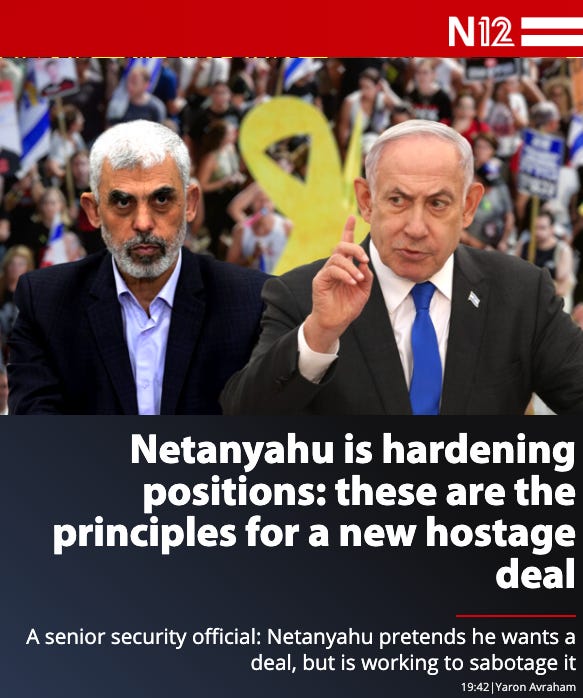Just as Shabbat was about to begin on Friday, as we were powering everything down, getting ready to light candles and head off to synagogue, our devices started pinging. “Hamas has informed Hezbollah that it has accepted the terms of the cease fire proposal,” they add said.
As bad as Gaza is, Lebanon would be much worse. Everyone here knows that. But Hezbollah says it will not stop firing on the north until there’s a deal with Hamas. If Hezbollah keeps it up in the north, Israel has said, we will strike them. (“And return them back to the stone age,” the army says, though Gaza raises significant doubts about whether turning their cities into moonscapes makes enough of a difference.)
So if Hamas had told Hezbollah that it had accepted the terms, it was not only that the fighting in Gaza might end—we might be avoiding the war in Lebanon which was looking rather imminent.
But we were starting Shabbat. We powered everything down and went off the grid.
The next morning, I asked a friend in shul if he believed those headlines we’d all read the afternoon before. “There’s no way,” he said. “Why would they accept the deal? Why’s it good for them? Why did they then say it?—Who knows. All we’ve learned in nine months is how much smarter than us they are. They’re running circles around us. This isn’t over.”
When we got back on the grid Saturday night, it appeared he was right. That alleged Hamas notification to Hezbollah had disappeared from the papers.
Which meant that the war was not over, and that the next day, today, we would hit the nine month milestone.
Which we did, today. Nine months.
Yes, there’s still some talk of a deal, but most Israelis do not believe Sinwar and they do not believe Netanyahu. Just tonight, Sunday, the press was reporting once again, even as hundreds of thousands of Israelis had taken to the street to renew those old protests, that Bibi was torpedoing the possible hostage deal.
So Israelis are using the nine-month anniversary of October 7 to take stock of where we are. As it does every day, Yisrael Hayom (the Adelson-founded paper meant to support Bibi that no longer supports Bibi) posted its statistics dashboard.
* 274 days of war * 120 hostages still being held in Gaza * 680 IDF personnel killed since the beginning of the war * 324 IDF personnel killed in battle since the ground operation began * 4091 IDF personnel wounded since the beginning of the war * 2080 IDF personnel wounded since the ground operation began
Nine months isn’t long enough for this to be Israel’s longest war, but it’s long enough to be getting close.
Nine months is a long time for the 100,000 Israelis from the north not to be in their homes.
Nine months is precisely the amount of time that passed between the announcement of the judicial reform plan the first week in January 2023 and the beginning of the war in October 2023. Nine months of internal close-to-warfare before, nine months of actual warfare since. Without question, the most devastating year and a half in Israel’s history.
Nine months, as the papers all pointed out today, means that if the female hostages were raped upon capture and if they got pregnant, well … it’s too much to even write.
So with today’s nine-month milestone all anyone seems to be talking about, the protests have resumed full force. At the Tel Aviv protest on Saturday night, the father of Guy Ilouz, who was killed on October 7, played for the crowd a recording of their final conversation. (It’s the video at the very top of the post.)
There were attempts to block traffic and “mess things up” (today was called a Yom Shibush,” a mess-things up day) everything. This was Haifa, in a video released by the protest movement.
Here was the protest in front of the headquarters of the Histadrut, the country’s largest labor union, with protesters demanding that the union shut the country down (video also posted by the protest movement):
Here was Jerusalem tonight (we waited to post this until after tonight’s protest). The chants had the same melody as last year, but the words had changed (I took the video):
Last year, it was “if there won’t be equality, we’ll topple the government. You messed with the wrong generation.”
Now, it was “you abandoned the south, you abandoned the north. You messed with the wrong generation.”
Bibi’s isn’t worried about the young generation—he’s worried about the Haredim and Smotrich/Ben-Gvir— anyone who can topple his government.
But he can’t snuff out the rage. In many ways, this place is a tinderbox once again.
As the Knesset was voting on whether to go our on summer recess (which they are, despite the fact that the soldiers are not on recess, the 100,000 internal refugees are not on recess and hostages are not on recess), the following unfolded in one of the committee rooms.
The video was posted on Israeli social media. Like the video at the top, of that last heartbreaking conversation between Guy Ilouz and his father, the one also got a lot of traction—because it captures in the voice of an exasperated young woman what so many people feel.
“Enough,” she said.
Yup. Enough of a lot of things.
Which is the straw that will break the back of the camel, we don’t yet know. But we may know very soon.













